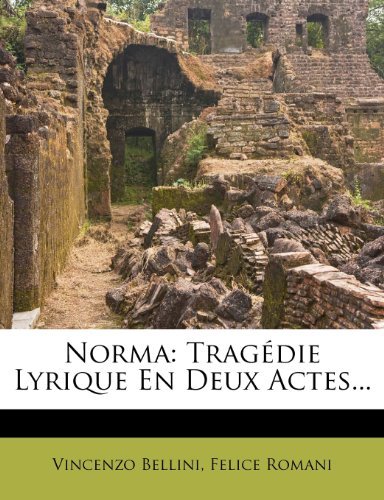Книга: Vincenzo Bellini, Felice Romani «Norma: Tragedie Lyrique En Deux Actes...»

|
This is a reproduction of a book published before 1923. This book may have occasional imperfections such as missing or blurred pages, poor pictures, errant marks, etc. that were either part of the original artifact, or were introduced by the scanning process. We believe this work is culturally important, and despite the imperfections, have elected to bring it back into print as part of our continuing commitment to the preservation of printed works worldwide. We appreciate your understanding of the imperfections in the preservation process, and hope you enjoy this valuable book. Издательство: "Nabu Press" (2012)
ISBN: 1278835970 Купить за 551.7 руб на Озоне |
Vincenzo Bellini
Vincenzo Salvatore Carmelo Francesco Bellini (
Life
Born in
Having learned from his grandfather, Bellini left provincial Catania in June 1819 to study at the conservatory in Naples, with a stipend from the municipal government of Catania. By 1822 he was in the class of the director Nicolò Zingarelli, studying the masters of the Neapolitan school and the orchestral works of Haydn and Mozart. It was the custom at the Conservatory to introduce a promising student to the public with a dramatic work: the result was Bellini's first opera "
Bellini spent the next years, 1827–33 in Milan, where all doors were open to him. Sparking controversy in the press for its new style and its restless harmonic shifts into remote keys, "
The next five years were triumphant, with major successes with his greatest works, "
Bellini died in
Works
Bellini's complete works are to be published in "Edizione critica delle opere di Vincenzo Bellini", Milan: Ricordi 2003-
Operas
* "
* "
* "
* "
* "
* "Zaira" (16 May 1829,
* "
* "
* "Norma" (26 December 1831, Teatro alla Scala, Milan)
* "
* "
Other important Bel Canto opera composers
*
*
*
External links
* [http://cylinders.library.ucsb.edu/search.php?query=Bellini%2C+Vincenzo&queryType=%40attr+1%3D1 Bellini cylinder recordings] , from the
*IMSLP|id=Bellini%2C_Vincenzo
*IckingArchive|idx=Bellini|name=Vincenzo Bellini
* [http://www.teatromassimobellini.it/ Teatro Massimo Bellini, Catania]
Источник: Vincenzo Bellini
Felice Romani
Felice Romani (
Biography
He later joined the faculty of the
Romani travelled widely in
As a rule, Romani did not create his own stories; he kept up with what was happening in the Paris theatre and adapted plays which were popular there, but this wasn't always a safe strategy, given the vague intellectual property rights legislation of the time. In one case, Romani prepared a libretto based on the play "Lucrezia Borgia" by
Romani wrote the librettos for Bellini's "
Romani was considered an ideal match for Bellini, who is quoted as having said: "Give me good verses and I will give you good music". Dramatic, even extravagant "situations" expressed in verses "designed to portray the passions in the liveliest manner" was what Bellini was looking for in a libretto, according to a letter to Florimo,
But the two had a falling out over missed deadlines for "Beatrice di Tenda.". After setting "
In 1834 Romani became editor of the "Gazzetta Ufficiale Piemontese" to which he contributed literary criticism. He retained the post, with a break 1849–1854, until his death, in
Источник: Felice Romani
Другие книги схожей тематики:
| Автор | Книга | Описание | Год | Цена | Тип книги |
|---|---|---|---|---|---|
| Vincenzo Bellini, Felice Romani | Norma: Tragedie Lyrique En Deux Actes... | This is a reproduction of a book published before 1923. This book may have occasional imperfections such as missing or blurred pages, poor pictures, errant marks, etc. that were either part of the… — Nabu Press, Подробнее... | 2012 | 551.7 | бумажная книга |
См. также в других словарях:
Norma (Bellini) — Norma (opéra) Pour les articles homonymes, voir Norma (homonymie). Norma est un opéra en deux actes de Vincenzo Bellini, sur un livret de Felice Romani, d après la tragédie d Alexandre Soumet Norma ou l Infanticide. Il fut créé le 26 décembre… … Wikipédia en Français
Norma (opera) — Norma (opéra) Pour les articles homonymes, voir Norma (homonymie). Norma est un opéra en deux actes de Vincenzo Bellini, sur un livret de Felice Romani, d après la tragédie d Alexandre Soumet Norma ou l Infanticide. Il fut créé le 26 décembre… … Wikipédia en Français
Norma (opéra) — Pour les articles homonymes, voir Norma (homonymie). Livret de 1891 Norma est un opéra en deux actes de Vincenzo Bellini, sur un livret d … Wikipédia en Français
Liste des œuvres de Richard Wagner — Article principal : Richard Wagner. Le tableau ci après présente la liste des œuvres musicales de Richard Wagner, rangées selon leur numéro dans le catalogue des œuvres de Wagner (W W V = Wagner Werk Verzeichnis). Pour les œuvres en prose,… … Wikipédia en Français
Alexandre Soumet — Louis Antoine Alexandre[1] Soumet est un poète et dramaturge français né à Castelnaudary (Aude) le 8 février 1786 … Wikipédia en Français
OPÉRA - Histoire, de Peri à Puccini — Si l’Italie n’a jamais pu reconquérir l’immense empire que les Romains avaient bâti grâce à l’efficacité de leurs légions, elle a su trouver d’autres moyens, plus pacifiques, de repartir à l’assaut de l’Europe. L’opéra, qu’elle invente à l’aube… … Encyclopédie Universelle
